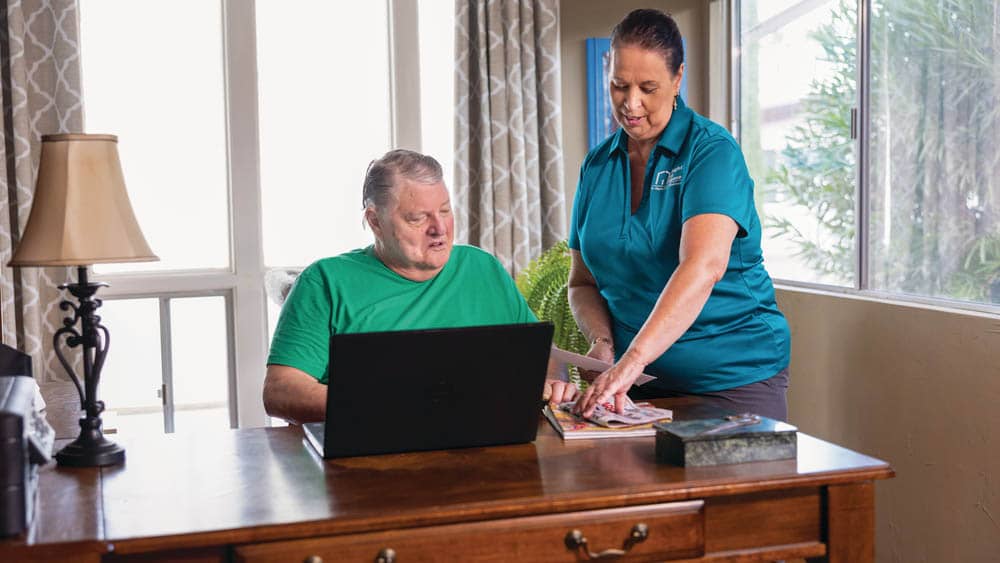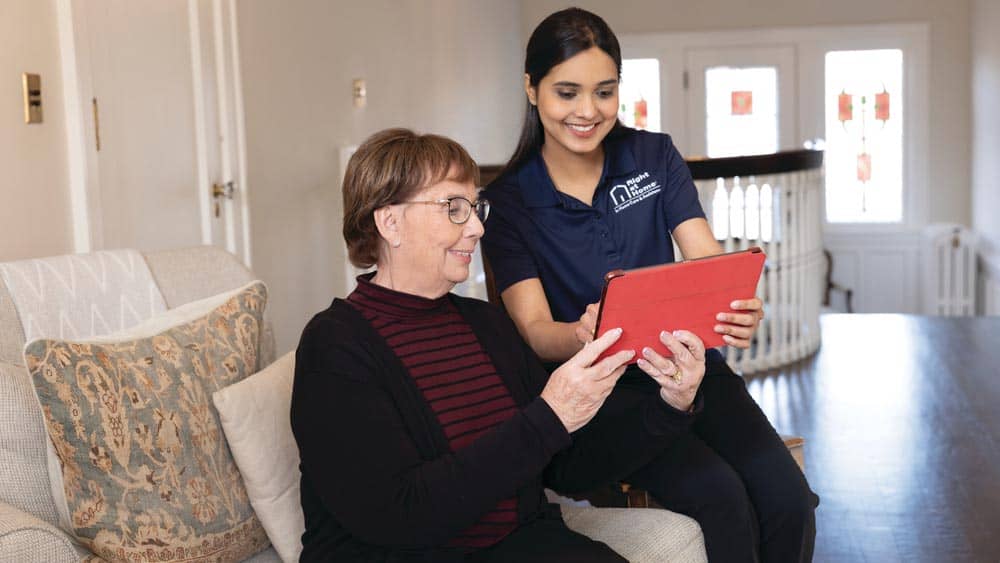

Protect Against Scams Targeting Seniors
How To Help Your Aging Loved One Exercise Caution
Falling for a scam is easier than many people think. For older adults who are not tech-savvy, the risk of being taken advantage of increases, especially when one is not vigilant in scrutinizing incoming phone calls, emails, and texts. Financial predators often prey on vulnerable seniors by pretending to represent legitimate organizations, government agencies, and even law enforcement authorities and asking them to provide personal financial information that gives these imposters access to credit cards or bank accounts. Here are tips to help exercise caution and apply common sense practices as a first line of defense.
Avoiding Senior Scams: The Basics
Here are some red flags to watch out for and common sense truths to help stay vigilant:
- Never provide personal information to someone you don’t know or who cannot verify their identity. If anything at all seems fishy or off-putting about an offer, trust your instincts and end the call. If it’s a text or email, do not open any attachments. If you’re unsure, do what due diligence you can by searching for the sender’s URL, phone number, and address to see if anything verifiable shows up or, conversely, if red flags and complaints appear in online forums about consumer fraud.
- Under no circumstances will a bona fide sweepstakes sponsor require winners to pay prize claim fees or taxes. Similarly, Medicare, the IRS, and banks will never contact you to demand personal account information by phone, email, or text for you to access added coverage, a refund, or a better rate. Law enforcement will never contact you demanding payment in place of investigation or arrest.
- If a senior has memory or cognitive issues, additional measures should be implemented. A trusted family caregiver can act as a monitor, overseer, and advocate to ensure no one is trying to take advantage of the senior’s vulnerability and is successfully duping them.
- Consider a next line of defense against scammers: web filtering software for digital devices. If a senior needs help accessing or downloading this, perhaps a relative, friend, or caregiver can assist. Some folks still have landlines, in which case they can ask their provider for an automated voicemail greeting that warns solicitors off. If the senior’s email or text gets deluged with ads for things they have no interest in subscribing to or never subscribed to in the first place, they can click the unsubscribe prompt. The same goes for seniors receiving postal junk mail inquiries and offers they didn’t sign up for or are no longer interested in receiving. Check the fine print for a website to visit, a number to call, or an address to write to request being taken off the sender’s mailing list.
Common Scams Targeting Seniors: More Advanced Techniques and What To Watch Out For
Here are some common scams targeting older adults and the red flags to watch out for to help avoid being taken.
- Help me, Grandma/Grandpa plea: A caller pretending to be a grandchild will try to manipulate a senior into believing they are in trouble and urgently need money. The imposter usually wants a money order or wire transfer since those methods of payment are hard to trace.
- Romance-intrigue schemes: Seniors looking for intimate human connection must be careful not to fall victim to emotional blackmail by sharing personal financial information or being lured into sending money to strangers.
- Predatory tech support: Disregard intrusive pop-up ads or messages on your devices that try to scare you into believing you urgently need to purchase tech support to remove software viruses. Legitimate tech companies don’t operate that way.
- Alluring business or investment opportunities: If an offer to buy into a business or to make an investment sounds too good to be true, then it almost certainly is, especially if the opportunity comes from someone you don’t know or haven’t done business with before.
- Demands to pay up front: Demanding payment in advance for things like home repairs is not a standard operating procedure for reputable service companies and should be a red flag. Don’t pay up front for work yet to be done.
Holiday Shopping: Scams To Watch Out For
It is the season for gift-giving, and older adults might be especially targeted when online shopping. Here are situations to be on guard against:
- Phony online stores that mirror real ones will try luring you into their websites to spend good money on nonexistent products you will never receive.
- Bogus missed delivery/nondelivery notifications are designed to elicit your sensitive financial information. If a notification comes from a vendor you didn’t purchase from or for a product you didn’t order, ignore or trash it.
- Gift card scams try tricking you into buying a gift card with a zero-dollar value or try getting you to use a card to purchase nonexistent products or services. Avoid anything to do with gift cards you did not buy yourself at a reputable store or did not receive from a person you trust.
- Fake charities that may appear to be the real thing but are just out to swindle you often use pressure or emotional manipulation tactics to get you to donate. Don’t accept any organization that asks for money at face value unless you have dealt with it before or can verify its credibility via a simple online search.
- Phishing emails or texts send you to sites where your data can be breached. Don’t click on attachments from unknown or dubious sources.
Protecting Your Elderly Loved One From Scams
Older adults and their family caregivers should carefully read any service contract before signing and, if in doubt, have a trustworthy friend or relative review it. The same goes for things like reverse mortgages, loans, annuities, insurance policies, and long-term care plans. While these instruments may be legitimate, there may be hidden costs or fees, which is why a trusted advocate, expert, or attorney should be consulted. If a low-income senior cannot afford to pay for expert legal help, they can check with their local Area Agency on Aging or university law school about free legal services.
If you or a loved one does fall for a scam or suspect one, call the U.S. Department of Justice’s National Elder Fraud Hotline at 1-833-FRAUD-11 (833-372-8311). If you believe you or a loved one is the victim of an online scam, file a report with the FBI’s Internet Crime Complaint Center at IC3.gov or contact your local law enforcement office. Other oversight resources that may help include:
- The National Adult Protective Services Association
- The National Center on Elder Abuse
- AARP ElderWatch
- Federal Trade Commission
How Right at Home Can Help
For almost 30 years, Right at Home has been helping families navigate the aging journey. When a family member can’t be there, our professionally trained and background-checked caregivers can lend a helping hand with everything from shopping and meal preparation to hygiene and toileting assistance. Use our office locator to find the office nearest you and ask for a FREE in-home consultation.
Interested in receiving helpful tips and advice about the aging journey delivered to your email inbox? Subscribe to our monthly Caring Right at Home e-newsletter today.







